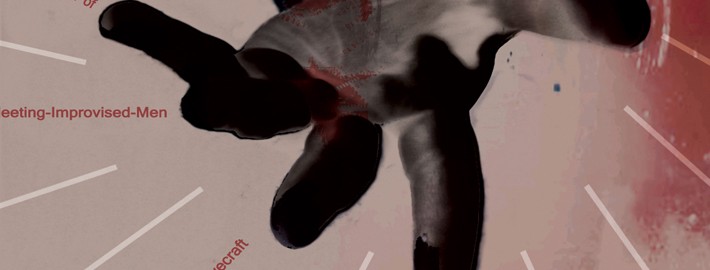Books & Culture
REVIEW: The Natural Dissolution of Fleeting-Improvised-Men by Gabriel Blackwell

by John Domini

Gabriel Blackwell’s new novel trades in dread, its “dissolution” a reprise of the chilling fade in his debut, Shadow Man (2012), yet the reading has its own pleasures, in particular the yelp of recognition: “All along my route these obscene shades climbed out of basements and storm drains or darted out of alleys… like an umbral army rousted from the crypts and mausoleums of Providence.”
The style of H.P. Lovecraft fits so comfortably here that anyone familiar with Blackwell’s previous novel will be all the more impressed.
Shadow Man likewise erased identity behind washes of language, but with the telegrammatic punch of noir. The change of key, this time out, reveals adept fingering.
Dissolution serves up a layer cake of terror and entrapment in which Lovecraft is merely the frosting. The novel follows the plan of Pale Fire, creating a text with commentary, and the author speaks from behind a doppelganger “Gabriel Blackwell,” impoverished by chasing a runaway girlfriend across the country to Providence. This narrator finds bottom-rung work, pulping papers, and stumbles across the last letter completed by Lovecraft (a legendary correspondent). More intriguing still, the letter’s addressed to yet another Gabriel Blackwell, care of an insane asylum.
The book in hand, then, combines Lovecraft’s letter, the mysterious correspondent, and Blackwell’s commentary — all three in downward spiral.
As for Lovecraft, he’s beset by an “umbral army” which may be deathbed hallucinations or may be the Eldritch itself, set loose somehow by the “Blackwell” to whom he’s writing. That’s the fun part, as I say: a parody of the “Master of the Weird” that itself sends shivers. Dissolution’s other two tumbles, however, prove less engaging.
The Blackwell working the paper shredder begins with the difficulties of Lovecraft’s manuscript: “The thicket of… characters, …their lack of line breaks….” In footnotes and endnotes, he does little besides reiterate such ambiguities. Even the mugging that robs him of the original amounts to another degree of unreliability. The robbery mirrors the Lovecraft letter, in that both narratives feature mutilation, and indeed this Blackwell turns into a horror story: “ink-smeared… a blistering blackened thing.” Neat as the correlation may be, though, it only takes us back to where we’ve been since the first, with both text and reader going to pieces.
As for the other Blackwell, the asylum inmate — his letter to Lovecraft apparently contained sketches of Cthulu creatures, and so triggered the final delirium.
It prompted the entire meta-exercise we’re reading via its echo of an earlier brilliant madman.
Daniel Schreber, a German judge from the turn of the previous century, published a notorious memoir of his psychotic break, and Blackwell’s novel takes its title from Schreber’s 1903 text, referenced explicitly in a couple of footnotes. Schreber too saw human beings as “fleeting-improvised,” dissolving, and so he provides yet another avatar for the “Darkness,” which in Blackwell’s novel is “a constant, hidden only to those who wished not to see it.”
The layer cake, that is, risks a lack of variety. A passion for the dark never hurt W.G. Sebald, to be sure, but then Sebald never allowed promising story possibilities to drop. Blackwell abandons such promise (a detective, a pregnancy) in favor of ruminations on his impossible paperwork.
On the other hand, he begins and ends in poverty and homelessness, and, really, is there a scarier thing of darkness? This novel’s richest passages — distinctive for more than wordplay — come when our commentator grapples with living down and out in 21st-Century America. There he finds the last work of a fascinating writer and, with next to no resources, he must try to forge meaning. The worst of the monsters haunting Dissolution is that of literature itself, fallen among the use-and-discard labor force.
The Natural Dissolution of Fleeting-Improvised-Men: The Last Letter of H.P. Lovecraft

by H P Lovecraft










